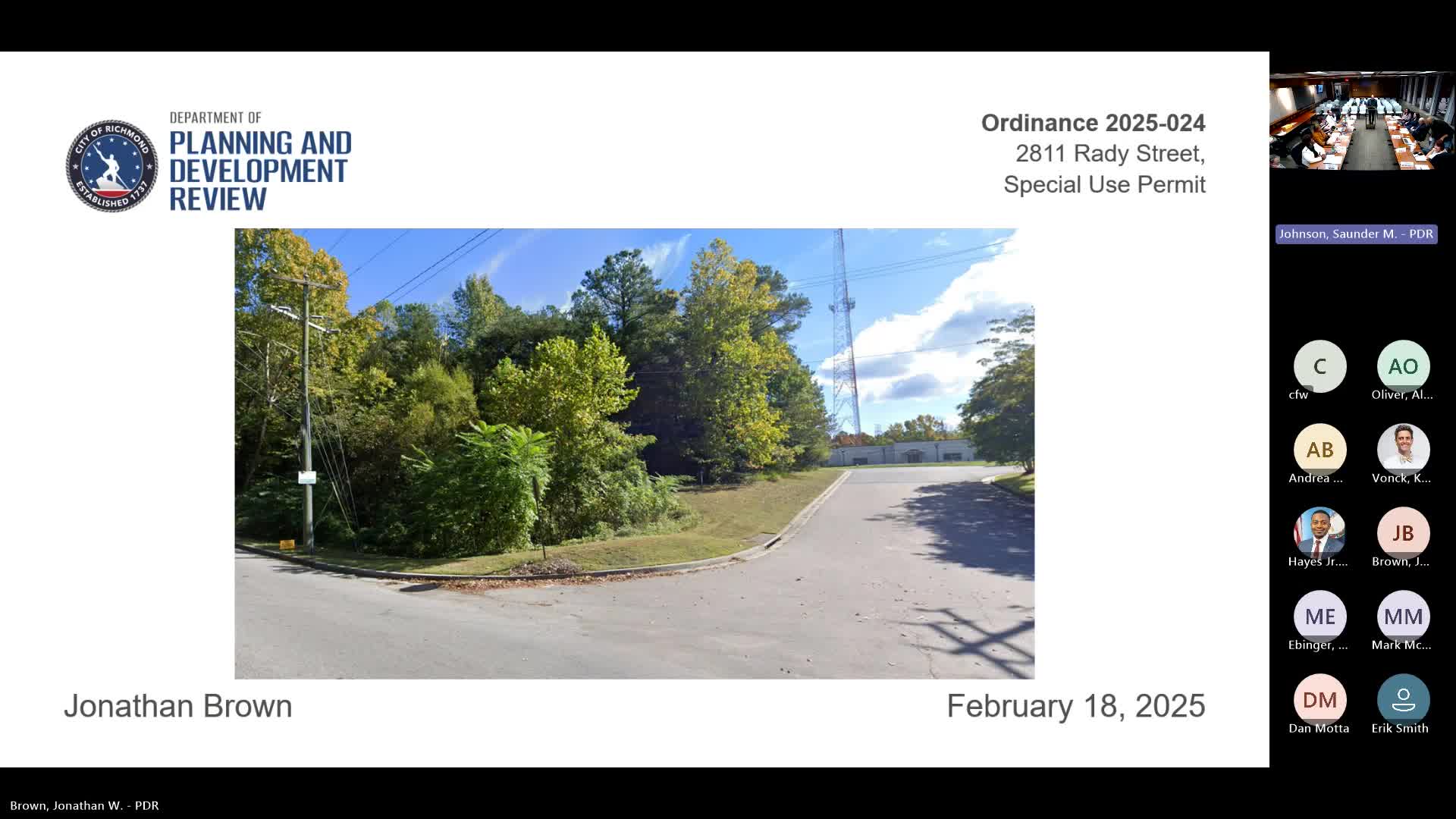Planning Commission recommends approval for 352‑unit Brady Street proposal despite staff concerns about industrial land‑use designation
October 02, 2025 | Richmond City (Independent City), Virginia
This article was created by AI summarizing key points discussed. AI makes mistakes, so for full details and context, please refer to the video of the full meeting. Please report any errors so we can fix them. Report an error »

The Richmond Planning Commission voted Feb. 20 to forward a recommendation of approval to City Council for a proposed multifamily development at 2811 Brady Street that would create up to 352 dwelling units and public‑realm improvements, despite staff recommendations to deny the SUP because the Richmond 300 master plan designates the site for industrial use.
The applicant presented plans for a 23‑acre site in the Magnolia Industrial Center neighborhood — a property that is partly zoned m2 (heavy industrial) and partly r6 (single‑family attached). The proposal includes four multifamily buildings, a clubhouse and pool, long‑ and short‑term bicycle parking, and new public‑right‑of‑way improvements including an extension of Byrd Street and a crosswalk across Brady Court to improve pedestrian connectivity to the Highland Park neighborhood and 6‑Points micro node.
Staff recommended denial on the ground that the master plan’s industrial designation does not include residential use and that the city should preserve industrial land for employment and economic uses. Staff also noted that much of the parcel’s topography and a culverted stream present development challenges. Nevertheless, staff acknowledged that the applicant had substantially revised the layout in response to staff suggestions to prioritize walkability and place most parking to the rear of buildings.
Applicant counsel and Brownfield representatives and Elmington (developer) argued the project would deliver 60‑percent‑area‑median‑income (AMI) affordable rental units and that the site’s constraints make it unlikely to be attractive for high‑value industrial tenants. The developer said the proposal would create new street connections, improve pedestrian access to transit and the neighboring community, and include affordable units that would require city affordable‑housing performance grants to align the project’s finances.
Commission discussion focused on competing public policy goals: preserving industrial land for jobs versus meeting the city’s stated affordable‑housing production goals. Several commissioners noted the project would deliver a large number of affordable units in a location that is otherwise unlikely to attract industrial investment and stressed the importance of linkage to the city’s affordable‑housing funding apparatus.
After debate and a public comment period in which supporters urged the commission to prioritize housing and neighborhood connectivity, the commission voted to recommend approval. The motion passed by roll call; the vote will be transmitted to City Council, which will consider any associated affordability grant and final approvals.
If council approves the SUP and the associated affordable‑housing grant, the developer will be required to complete right‑of‑way improvements and transfer completed infrastructure to the city as a condition of final certificates of occupancy.
The applicant presented plans for a 23‑acre site in the Magnolia Industrial Center neighborhood — a property that is partly zoned m2 (heavy industrial) and partly r6 (single‑family attached). The proposal includes four multifamily buildings, a clubhouse and pool, long‑ and short‑term bicycle parking, and new public‑right‑of‑way improvements including an extension of Byrd Street and a crosswalk across Brady Court to improve pedestrian connectivity to the Highland Park neighborhood and 6‑Points micro node.
Staff recommended denial on the ground that the master plan’s industrial designation does not include residential use and that the city should preserve industrial land for employment and economic uses. Staff also noted that much of the parcel’s topography and a culverted stream present development challenges. Nevertheless, staff acknowledged that the applicant had substantially revised the layout in response to staff suggestions to prioritize walkability and place most parking to the rear of buildings.
Applicant counsel and Brownfield representatives and Elmington (developer) argued the project would deliver 60‑percent‑area‑median‑income (AMI) affordable rental units and that the site’s constraints make it unlikely to be attractive for high‑value industrial tenants. The developer said the proposal would create new street connections, improve pedestrian access to transit and the neighboring community, and include affordable units that would require city affordable‑housing performance grants to align the project’s finances.
Commission discussion focused on competing public policy goals: preserving industrial land for jobs versus meeting the city’s stated affordable‑housing production goals. Several commissioners noted the project would deliver a large number of affordable units in a location that is otherwise unlikely to attract industrial investment and stressed the importance of linkage to the city’s affordable‑housing funding apparatus.
After debate and a public comment period in which supporters urged the commission to prioritize housing and neighborhood connectivity, the commission voted to recommend approval. The motion passed by roll call; the vote will be transmitted to City Council, which will consider any associated affordability grant and final approvals.
If council approves the SUP and the associated affordable‑housing grant, the developer will be required to complete right‑of‑way improvements and transfer completed infrastructure to the city as a condition of final certificates of occupancy.
View full meeting
This article is based on a recent meeting—watch the full video and explore the complete transcript for deeper insights into the discussion.
View full meeting
